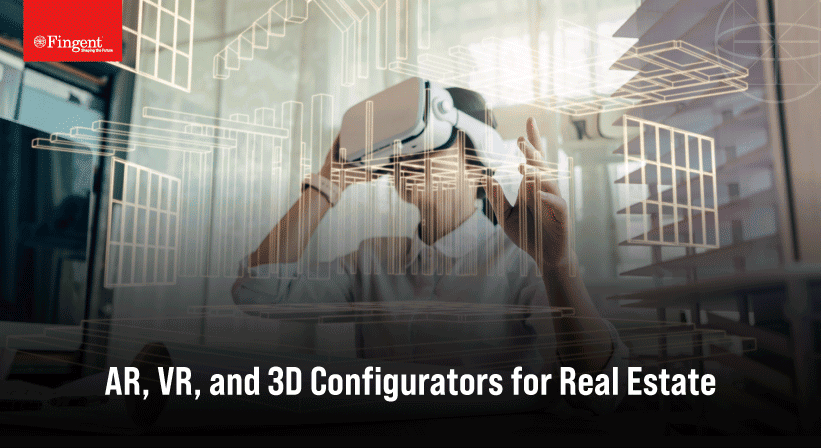Futuristic Technologies Transforming The Real Estate Industry!
According to a 2020 report, 58% of real estate brokers have a clearly defined digital strategy, a figure that represents a 6% increase from the two previous years and thus indicates that an increasingly large percentage of the real estate industry is buying into the concept of digital transformation.
While the real estate industry is — and always will be — centered around interpersonal interactions between buyers, sellers, and agents, technology plays a more significant role in these transactions than ever before. Innovative real estate firms worldwide are leveraging futuristic technology far more frequently, and those that fail to adapt will find it hard to keep up.
Technology such as machine learning (ML) software, artificial intelligence (AI)-powered mobile apps, drones, and augmented reality (AR) solutions are no longer just “nice to have” in the real estate industry. Digital transformation is an inevitability that real estate professionals must embrace if they want to thrive in such a rapidly evolving business space.
Why Digital Transformation Is Inevitable for the Real Estate Industry
While many factors fuel digital transformation in the real estate industry, the most potent catalyst is consumers. Home buyers and sellers have grown accustomed to being able to perform a variety of essential life tasks online thanks to the ever-evolving nature of smartphones and other sophisticated internet-connected devices.
According to a 2022 report, 51% of all home buyers found the properties they purchased via the internet. Another 29% found their dream home with the assistance of a real estate agent, whereas just 4% located the home they eventually purchased via traditional signage.
These statistics indicate that the vast majority of prospective buyers are taking charge in their search for their next home. Real estate agents who want to keep pace must incorporate futuristic technology into their sales models or risk finding it increasingly difficult to provide consumers with the efficient and primarily digital experience they prefer.
Still, the industry is about more than buying and selling homes and real estate technology means more than improving sales. Many property management firms want to leverage technology for payment platforms, leasing and facility management, back office processes, and more. Most important to these management teams is having all those processes in one place.
Read more: Reshaping Real Estate Operations with Fully Integrated End-to-End Software.
Futuristic Technology is Poised to Reshape Real Estate
The real estate industry can solve many existing challenges by embracing digital technologies. From complex workflows brought on by the multitude of activities required of a real estate firm to communication shortfalls, there are many leading technologies that property services can embrace as part of a digital transformation. While there is no single answer, some forms of futuristic technology that are already making a big splash in the real estate industry include:
1. ML and AI
Machine learning and artificial intelligence technologies are true game changers for the real estate industry. They enable real estate agents and brokers to automate redundant tasks, like creating timesheets, filling out paperwork, generating offer documents, or scheduling meetings. Within property management, automation can lead to higher sales volumes, efficient back-office solutions, and a more valuable experience for clients and management teams.
2. Mobile Applications
Real estate agents and property managers are always on the go, and while smartphones help them stay connected to clients and co-workers while in the field, these devices are only as good as the applications installed on them.
With that in mind, many real estate firms are turning to robust mobile applications that are purpose-built for the real estate industry. These applications can enable the performance of a wide array of tasks remotely, including approving documents, sending forms to clients, and much more.
3. All-in-One Property Management Platforms
Traditionally, real estate firms that manage rental properties have done so by using a cobbled-together network of disparate applications. Though that kind of approach works, it is hardly ever efficient or cost-effective. Fortunately, dynamic, all-in-one property management platforms like Rentmoji exist.
Created by Fingent, Rentmoji empowers property managers to govern every facet of property management from a single, user-friendly platform that includes a mobile application. The platform includes a suite of interconnected apps, each of which addresses specific property management challenges and pain points.
With separate sub-portals for tenants, owners, and vendors, the Rentmoji suite provides complete transparency for all parties and makes process automation a breeze. Rentmoji is the reality of futuristic technology for the present.
4. Drones
Drones enable real estate agents to capture aerial pictures of a home and property to provide a more comprehensive overview of each listing. Unique and captivating aerial drone photos on an online listing will help real estate agents make the properties they are selling stand out. In addition, multiple listing service (MLS) reports that properties with drone images in the United States are 68% more likely to sell.
Agents can also use drones to help assess property lines, landscapes, and potential maintenance concerns. Real estate agents and property managers can then use this information to help clients make informed purchasing decisions or evaluate upkeep issues.
5. AR/VR Technologies
Virtual reality (VR) and AR technologies benefit firms that sell yet-to-be-completed homes. Agents can use these technologies to give buyers a sneak peek of a home before it is built, and these digital images can help agents close more deals and bring customers’ vision of their dream home to life much more quickly as a result.
AR and VR technologies can also be used to digitally stage properties, an approach that is much more cost-effective than bringing furniture in just to stage a vacant home. Staging properties with AR/VR tech makes vacant homes more appealing and can thus speed up the selling process.
Read more: Augmented Reality and Virtual Reality: Transforming The Real Estate Industry!
How Fingent Can Help Real Estate Firms Embrace Digital Technologies
If you operate within the real estate industry and want to gain a definitive edge by investing in digital transformation, Fingent is here to help. We create customized, futuristic technology that is tailor-made for the needs of your business.
We understand the challenges that affect the real estate industry. You’re seeking solutions to marketing challenges that help you stand out against the growing competition, and your business wants to adapt to evolving tech trends. We have a track record of solutions that are here to help.
Our custom software development professionals have created numerous real estate software solutions for clients that engage in every facet of the industry, from single-family residential sales to commercial property management.
To learn more about how Fingent can help you step into the future, contact our team today to schedule a consultation.
Stay up to date on what's new

Recommended Posts

20 Mar 2024 B2B
How Is Extended Reality (XR) Impacting Customer Behavior
Extended Reality (XR) is not a technological marvel. It's a force that is reshaping how we interact with the world. This blog will help you discover how XR catalyzes the……

10 Jan 2024 B2B
AI Trends Set to Transform Businesses in 2024
In the dynamic realm of modern business, the profound impact of artificial intelligence (AI) continues to unfold, reshaping industries and redefining conventional practices. As we step into 2024, the transformative……

08 Jul 2023 B2B
AR, VR, and 3D Configurators for Real Estate
The implementation and development of immersive digital technologies such as Artificial Intelligence, Augmented Reality, Virtual Reality, Machine Learning, and 3D Configurators have drastically changed the way the world works. These……

14 Jun 2023 B2B
How Artificial Intelligence Can Help Create Transforming Mobile Apps!
Today we live in a world where machines possess an extraordinary ability to learn, reason, and make decisions, much like the human mind. This remarkable realm of technology known as……
Featured Blogs
Stay up to date on
what's new

























































